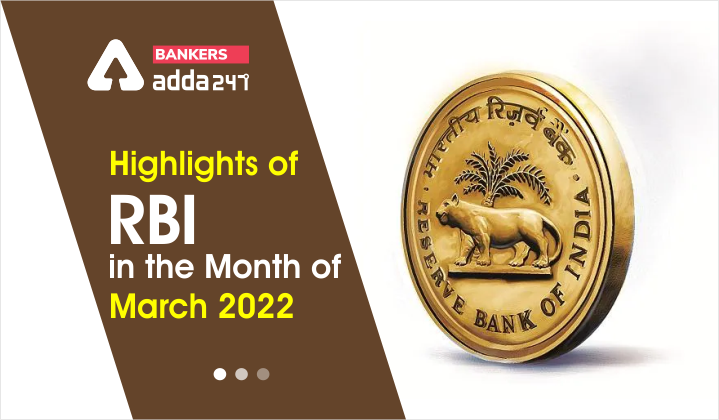Highlights of RBI Announcements in March 2022
1. RBI proposed to assess the impact of its multi-media awareness campaigns that promote financial literacy and safe banking practices and runs the ‘RBI Kehta Hai’ campaign to educate and empower the public about banking regulations.
- RBI Kehta hai campaign runs is in 14 languages.
2. RBI exempted the investments made in Umbrella Organization (UO) by Primary (Urban) Cooperative Banks (UCBs) from non-Statutory Liquidity Ratio (non-SLR) holding limits prescribed in Paragraphs 2(i) and 2(iii)(b) of the RBI’s circular ‘Investments in Non-SLR securities by Primary (Urban) Co-operative Banks ‘dated 30th January 2009.
- Effect of this move: This will encourage UCBs to subscribe to the capital of UO and acquire its membership. it will give liquidity support to UCB
- Note: The UO is a non-banking finance company (NBFC) with strong financial parameters. Umbrella organization was discussed in the N S Viswanathan committee.
- Non-SLR securities are debentures/bonds, preference shares, equity shares, mutual fund units, commercial paper, and investments in securities issued by a securitization/reconstruction company.
3. RBI has chosen Intellect Design Arena Limited, to implement the upgraded version of the ‘CloudNative Intellect Quantum Core Banking solution’ to power the next stage of their digital transformation agenda.
- ‘CloudNative Intellect Quantum Core Banking solution is the RBI Platform– e-Kuber for central banking operation.
- Intellect Design Arena Limited: a specialist in applying true digital technologies
- Headquarters – Chennai, Tamil Nadu
- Chairman & Managing Director (MD) – Arun Jain
4. RBI & the National Payment Corporation of India (NPCI) launched two landmark initiatives UPI123Pay and DigiSaathi.
- UPI 123Pay gives four technology alternatives.
- calling an IVR (interactive voice response) number, (080 4516 3666 & 080 4516 3581 & 6366 200 200)
- app functionality in feature phones
- missed call-based approach
- proximity sound-based payments
- Why UPI123pay when we had the USSD platform?
Earlier UPI can be accessed through NUUP (National Unified USSD Platform) using the shortcode of *99#. But this option is cumbersome and not popular. That’s why the launch of UPI123 pay
- DigiSaathi – An initiative by the consortium of Payment System Operators and Participants (banks & non-banks) in India. DigiSaathi is a 24 x 7 Helpline for providing information on digital payment products and services
5. RBI released a booklet titled “BE(A)WARE” that provides information on the common modus operandi used by fraudsters and precautions to be taken while carrying out various financial transactions.
- Certain important points from the document
- Vishing: It refers to phone calls pretending to be from bank / non-bank e-wallet providers/telecom service providers luring customers into sharing confidential details in the pretext of KYC-updation, unblocking of account / SIM-card, crediting debited amount, etc
- Phishing: It refers to spoofed emails and/or SMSs designed to dupe customers into thinking that the communication has originated from their bank/e-wallet provider and contains links to extract confidential details
- Money mule: It is a term used to describe victims who are exploited by fraudsters into laundering stolen / illegal money via their bank account(s).
- Juice jacking: The charging port of a mobile, can also be used to transfer files/data. Fraudsters use public charging ports to transfer malware to customer phones connected there and take control/access/steal data sensitive data such as emails, SMS, saved passwords, etc. from the customers’ mobile phones (Juice Jacking).
- Skimming: Fraudsters install skimming devices in ATM machines and steal data from the customer’s card
6. RBI issued modified norms on ‘Interest Equalization Scheme (IES) on Pre and Post Shipment Rupee Export Credit-Extension’ after the extension of the scheme till March 31, 2024, by the Central Government w.e.f. October 1, 2021.
- Interest Equalization Scheme (IES)- Implemented on April 1, 2015.
- Earlier called Interest Subvention Scheme)
- It provides pre and post-shipment export credit to exporters in rupees. Exporters were facing increasing credit costs in their export cycles due to the stagnation of global demand and extended credit periods. Now, this scheme enables exporters to correct their pricing and improve the competitiveness of their products.
- The extended scheme will not be applicable to the one’s availing benefit under any Production Linked Incentive (PLI) scheme of the Central Government
- The telecom instrument sector having six HS (Harmonised System) lines will not be included, except for MSME (Ministry of Micro, Small & Medium Enterprises) manufacturer exporters.
7. RBI announced that National Bank for Financing Infrastructure and Development (NaBFID) will be regulated and supervised as an All-India Financial Institution (AIFI) by it under the Sections 45L and 45N of Reserve Bank of India (RBI) Act, 1934,
-
- NaBFID has been set up as a Development Financial Institution (DFI) to support the development of long-term infrastructure financing in India
- Chairman: K V Kamath
- It shall be the 5th AIFI others are
- Export-Import (EXIM) Bank,
- National Bank for Agriculture and Rural Development (NABARD),
- National Housing Bank (NHB)
- Small Industries Development Bank of India (SIDBI). • Note – Veteran Banker KV Kamath is the chairman of NaBFID
- NaBFID is being set up as a corporate body with an authorized share capital of one lakh crore rupees.
8. RBI issued ‘RBI (Regulatory Framework for Microfinance Loans) Directions, 2022’ which will be effective from April 01, 2022, for all the types of banks but not payments bank
- Microfinance Loan- It is defined as a collateral-free loan given to a household having an annual household income up to Rs 3,00,000, where household means an individual family unit, i.e., husband, wife, and their unmarried children
- Important Guidelines: Cap on loan repayment: The guidelines prescribe a limit on loan repayment obligations of a household. The outflows, capped at 50% of the monthly household income, should include repayments (including both principal as well as interest components)
9. The Governor of RBI, Shaktikanta Das inaugurated the Reserve Bank Innovation Hub (RBIH) with an initial capital contribution of Rs 100 crore in Bengaluru, Karnataka, set up as a Section 8 company under the Companies Act, 2013,
-
- Senapathy (Kris) Gopalakrishnan, co-founder, and former co-Chairman, of Infosys, was earlier appointed as RBIH 1st Chairman.
10. RBI issued a framework for Geo-tagging of Payment System TouchPoints/acceptance infrastructure under Section 10 (2) read with Section 18 of Payment and Settlement Systems Act, 2007 (Act 51 of 2007).
- To capture the accurate location of existing payment system touchpoints in order to make them accessible at all times.
- Note : Geo-tagging: It captures the geographical coordinates (latitude and longitude) of payment touchpoints deployed by merchants to receive payments from their customers.
- ii. Infrastructure: It is digital payment transactions carried out by customers using payment touchpoints. It uses two broad categories of physical infrastructure:
- Banking infrastructure: It comprises bank branches, offices, extension counters, Automated Teller Machines (ATMs) / Cash Deposit Machines (CDMs), Cash Recycler Machines (CRMs), and micro ATMs used by Business Correspondents (BCs), etc.
- Payment acceptance infrastructure: It comprises Points of Sale (PoS) terminals, Quick Response (QR) codes deployed by banks / non-bank Payment System Operators (PSOs), etc.
11. Other RBI Notification
-
- RBI cautioned the public against carpooling app sRide, which is operating a semi-closed pre-paid instrument without authorization from the central bank under the provisions of the Payment and Settlement Systems Act, 2007.
- HDFC digital operations were banned
- Paytm was barred from onboarding new customers
- LivQuik became the first Prepaid Payment Instrument (PPI) issuer to have achieved full interoperability as mandated by the Reserve Bank of India (RBI) for their PPIs
Highlights of RBI in the Month of April 2022




 GA Capsule for SBI Clerk Mains 2025, Dow...
GA Capsule for SBI Clerk Mains 2025, Dow...
 The Hindu Review October 2022: Download ...
The Hindu Review October 2022: Download ...
 Test Prime Subscription by Adda247
Test Prime Subscription by Adda247


